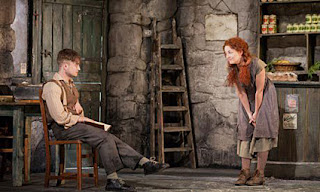Attending a performance of The Cripple of Inishmaan on Friday was, in many ways, one of the odder evenings in the theatrical part of my life.
A brief background note is worth making here: after years of going to the theatre very regularly for reviewing purposes - sometimes three or even four times a week - I became a lapsed theatregoer.
It wasn’t deliberate, but happened – largely because of a lack of money and also because of a lack of being used to planning evenings out and actually booking tickets.
In recent years, we’ve made an effort to start going ... well, if not ‘regularly’, then at least a few times a year.
We had seen this third play in this inaugural Michael Grandage Company season listed and thought it looked interesting, but equally thought that, for reasons of it starring Daniel ‘Harry Potter’ Radcliffe, we’d not get near tickets for all the fan girls.
As it happened, we were wrong and, because I’m automatically on the company emailing list now, having previously seen both Privates on Parade and the absolutely wonderful Peter and Alice, I received an email a couple of weeks ago telling me that tickets were still available.
We snapped up a pair.
First, the audience did include a large number of girls. As we left, The Other Half even spotted several pf them heading to the stage door with roses in hand.
But what a great way to get people to go to the theatre.
Anyway, back to the play – or most pertinantly, a play that I had no prior knowledge of.
I imagined that it was quite old – it’s set in the 1930s – and on the surface, is full of Irish stereotypes. There were times I wondered whether I was watching The Quiet Man meets Father Ted.
Yet this is a play from 1997, by Martin McDonagh, who also wrote and directed the wonderful film, In Bruges. And in many ways, this gives you a platform from which to understand this play and help you get past a sense that you're seeing Maureen O'Hara meet Pauline McLynn.
 The central idea is that a film crew from Hollywood arrives in a small Irish community that struggles against the elements, to film a documentary (based on fact).
The central idea is that a film crew from Hollywood arrives in a small Irish community that struggles against the elements, to film a documentary (based on fact).
The villagers react in differing ways, but ‘Cripple’ Billy, a 17-year-old orphan with a somewhat mysterious past, who’s only pastime is staring at cows, at once sees the falseness of the celluloid hopes, but also the chance to escape his mind-numbing existence.
What McDonagh has done is to create a very funny play that leaves you with a number of questions about the nature of home and expectations, the stories that we all tell and construct around ourselves (the stereotypes are a crucial part of this) and the importance of storytelling in human experience.
It is delightfully done, and the very fact of how you personally react to the stereotypes – do you recognise them as such, how then do you react to them etc – are important elements in the questions that the writer asks about how we all react to stories and how we all portray ourselves.
As to the cast – well, it’s an excellent ensemble performance.
But special mentions to Sarah Greene as Helen and Pat Shortt as Johnnypateenmike.
And then we come to young Master Radcliffe.
If one had any worries that one would be watching Harry Potter, they disappear the moment he arrives on stage.
This is a remarkably talented young actor – perhaps far more so than many might expect. The team decided that his Billy’s disability is cerebral palsy, and Radcliffe shows enormous physical discipline in maintaining his character’s condition.
Where McDonagh doesn’t opt for easy stereotype is in his writing of Billy – this is no disabled archetype (a welcome point in these Atos times), and Radcliffe’s understated but emotionally powerful performance is exemplary.
There are no sloppy excuses for genuine depth of character – and this is why, in very large part, the play works in spite of so many apparent stereotypes.
Radcliffe is a very bright young talent – and a joy to watch.
It is an excellent evening out – and one that, perhaps unexpectedly, leaves the audience with a tantalising series of questions to muse on later.
There is a brutality about the play, but also great warmth and, ultimately, real humanity, without it ever having plunged into mawkish sentimentality – see In Bruges.
So if you get the chance – well, go on, go on, go on: you know you want to.
And if you don't, watch out for this company, because one really hopes that will be more than a one-season wonder.


No comments:
Post a Comment